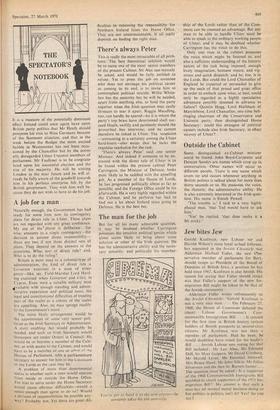A job for a man
Naturally enough, the Government has had ready for some time now its contingency plans for direct rule in Ulster. These plans are not regarded with any great confidence. My use of the' plural is deliberate: for what amounts to a single contingency—the decision to assume direct responsibility— there are two if not three distinct sets of plans. They depend on the answers to the questions, What sort of direct rule? and, Who is to do the ruling?
Britain is most used to a colonial-type of administration, the kind of direct rule a Governor exercises in a state of emer- gency—like. say, Field-Marshal Lord Hard- ing exercised when Governor and c-in-c in Cyprus. Even were a suitable military man ovailable with enough standing and admin- istrative experience and political nous, the legal and constitutional difficulties of treating part of the realm as a colony of the realm are appalling. Also, no man springs readily to the Government's mind.
The more likely arrangement would be the appointment of some very senior poli- tician as the Irish Secretary or Administrator. A short enabling Act would probably be needed, and such an Irish Secretary would thereupon act under Orders in Council. He would be or become a member of the Cabi- net, or with access to the Cabinet, and would have to be a member of one or oll1Pr of 'he Houses of Parliament, mirth a parliamentary secretary to answer for him in the Commons or the Lords as the case may be.
A problem of more than departmental status is whether such a man would operate from inside or outside •the Home Office. For him to serve under the Home Secretary would cause obvious difficulties—would a senior-enough man agree to do so? Would a division of responsibilities be possible any- way? Probably not. Yet there are great dif., ficulties in removing the responsibilty for Northern Ireland from the Home Office. They are not unsurmountable. It all really depends on finding the right man.










































 Previous page
Previous page